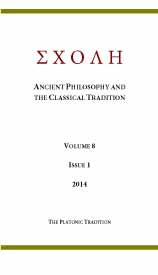TIME AND ETERNITY FROM PLOTINUS AND BOETHIUS TO EINSTEIN
TIME AND ETERNITY FROM PLOTINUS AND BOETHIUS TO EINSTEIN
Author(s): Michael ChaseSubject(s): Philosophy
Published by: Новосибирский государственный университет
Keywords: Plotinus; Boethius; Einstein; Pierre Hadot; Philosophy as a way of life; Philosophy of time; Aristotle; future contingents; free will; predestination; innate ideas; Pseudo-Boethius; De diis et praesensionibus; necessity; Proclus; Porphyry
Summary/Abstract: This article seeks to show that the views on time and eternity of Plotinus and Boethius are analogous to those implied by the block-time perspective in contemporary philosophy of time, as implied by the mathematical physics of Einstein and Minkowski. Both Einstein and Boethius utilized their theories of time and eternity with the practical goal of providing consolation to persons in distress; this practice of consolatio is compared to Pierre Hadot’s studies of the “Look from Above”, of the importance of concentrating on the present moment, and his emphasis on ancient philosophy as providing therapy for the soul, instead of mere abstract speculation for its own sake. In the first part of the article, Einstein’s views are compared with those of Plotinus, and with the elucidation of Plotinus’ views provided in the Arabic Theology of Aristotle. The second part of the article studies Boethius’ Consolation of Philosophy, which, contrary to recent interpretations, is indeed a genuine consolation rather than a parody thereof. The Consolation shows how the study of the Neoplatonic philosophical curriculum can lead the student along the path to salvation, by awakening and elaborating his innate ideas. To illustrate this doctrine, a passage from the little-known Pseudo-Boethian treatise De diis et praesensionibus is studied. Finally, after a survey of Boethius’ view on fate and providence, and Aristotle’s theory of future contingents, I study Boethius’ three main arguments in favor of the reconcilability of divine omniscience and human free will: the distinction between absolute and conditional necessity, the principle that the nature of knowledge is determined by the knower, and finally the doctrine that God lives in an eternal present, seeing past, present, and future simultaneously. This last view, developed primarily from Plotinus, is once again argued to be analogous to that advocated by contemporary block-time theorists on the basis of Eisteinian relativity. God’s supratemporal vision introduces no necessity into contingent events. Ultimate, objective reality, for Boethius as for Plotinus and Einstein, is atemporal, and our idea that there is a conflict between human free will and divine omniscience derives from a kind of optical illusion, caused by the fact that we cannot help but think in terms of temporality.
Journal: ΣΧΟΛΗ. Философское антиковедение и классическая традиция
- Issue Year: VIII/2014
- Issue No: 1
- Page Range: 67-110
- Page Count: 44
- Language: English

